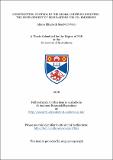Files in this item
Constructing control in the global shipping industry : the development of regulations for CO₂ emissions
Item metadata
| dc.contributor.advisor | Russell, Shona | |
| dc.contributor.author | MacNeill-Weir, Alison Elizabeth | |
| dc.coverage.spatial | xix, 314 p. | en_US |
| dc.date.accessioned | 2019-06-06T07:43:55Z | |
| dc.date.available | 2019-06-06T07:43:55Z | |
| dc.date.issued | 2018-12-07 | |
| dc.identifier.uri | https://hdl.handle.net/10023/17832 | |
| dc.description.abstract | Shipping transports between 80-90% of world trade (Smith et al. 2015). In 2012 the industry accounted for around 3% of global emissions with a predicted increase of between 50 and 250% by 2050 (Scott et al, 2017). As such, the question of how to regulate Shipping’s CO₂ emissions in line with international climate change agreements (e.g. the Paris Agreement) is of major concern. Current CO₂ regulations have been criticized as ineffective (Devanney 2010) with growing calls for new regulations (Cullinane & Cullinane 2013; Wan et al. 2018). Existing literature on the regulation of Shipping tends towards impact assessments, scientific critiques and general overviews. This thesis contributes an ethnography of the development of new regulations. Ontologically constructionist, the research is guided by Actor-Network Theory, chosen for its applicability in scientific and technical communities, appreciation of non-human agency and its conceptualization of control through networked heterogeneity. The thesis follows development of new regulations in the Marine Environment Protection Committee (MEPC) of the International Maritime Organization (IMO). Directed by two questions ‘What actors constitute the MEPC?’ and ‘How does it create regulations?’ the thesis offers an account of the actors and processes that enable the construction of control over Shipping emissions. This account is produced from observational, interview, documentary and photographic data. The study contributes to the limited literature on Shipping regulation in three ways: (i) examining actor-roles in the network; (ii) illustrating network convergence informed by sociological framings of translation (Callon 1986a) and treason (Galis & Lee 2013); and (iii) tracing the agential qualities of concepts and principles enacted and acting in the MEPC. Their shared characteristics are distilled to create the typology: Meta-actor which strengthens the descriptive capabilities of ANT, extends the core principle of symmetry, facilitates new identifications of networked power, and illustrates a link between influence and vulnerability. Overall the thesis shows how a heterogeneous network of actors converges to produce regulation for the reduction of CO₂ emissions from Shipping. | en_US |
| dc.description.sponsorship | "This work was supported by a St Leonard’s 600th Scholarship from the University of St Andrews and additional financial support from the Sutherland Trust and the May Wong Smith Trust." -- Funding | en |
| dc.language.iso | en | en_US |
| dc.publisher | University of St Andrews | |
| dc.subject | Shipping industry | en_US |
| dc.subject | CO₂ emissions | en_US |
| dc.subject | Greenhouse gas emissions | en_US |
| dc.subject | Actor-network theory | en_US |
| dc.subject | Shipping regulations | en_US |
| dc.subject | International Maritime Organization | en_US |
| dc.subject | Marine Environment Protection Committee | en_US |
| dc.subject | Actors and networks | en_US |
| dc.subject | Power and control | en_US |
| dc.subject | Meta-actor | en_US |
| dc.subject | Symmetry | en_US |
| dc.subject | Consensus | en_US |
| dc.subject | The Paris Agreement | en_US |
| dc.subject.lcc | HE581.M6 | |
| dc.subject.lcsh | Shipping--Environmental aspects | en |
| dc.subject.lcsh | Shipping--Government policy | en |
| dc.subject.lcsh | Carbon dioxide mitigation | en |
| dc.subject.lcsh | Maritime law | en |
| dc.title | Constructing control in the global shipping industry : the development of regulations for CO₂ emissions | en_US |
| dc.type | Thesis | en_US |
| dc.contributor.sponsor | University of St Andrews. St Leonard's College | en_US |
| dc.contributor.sponsor | May Wong Smith Trust | en_US |
| dc.contributor.sponsor | Sutherland Page Trust | en_US |
| dc.type.qualificationlevel | Doctoral | en_US |
| dc.type.qualificationname | PhD Doctor of Philosophy | en_US |
| dc.publisher.institution | The University of St Andrews | en_US |
This item appears in the following Collection(s)
Items in the St Andrews Research Repository are protected by copyright, with all rights reserved, unless otherwise indicated.

